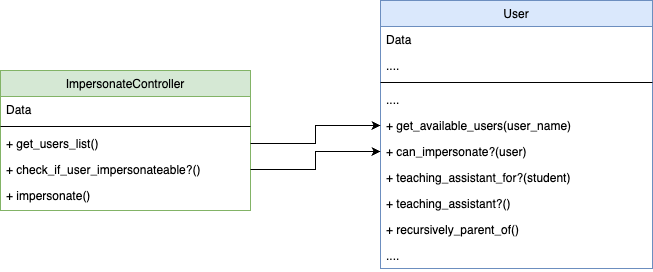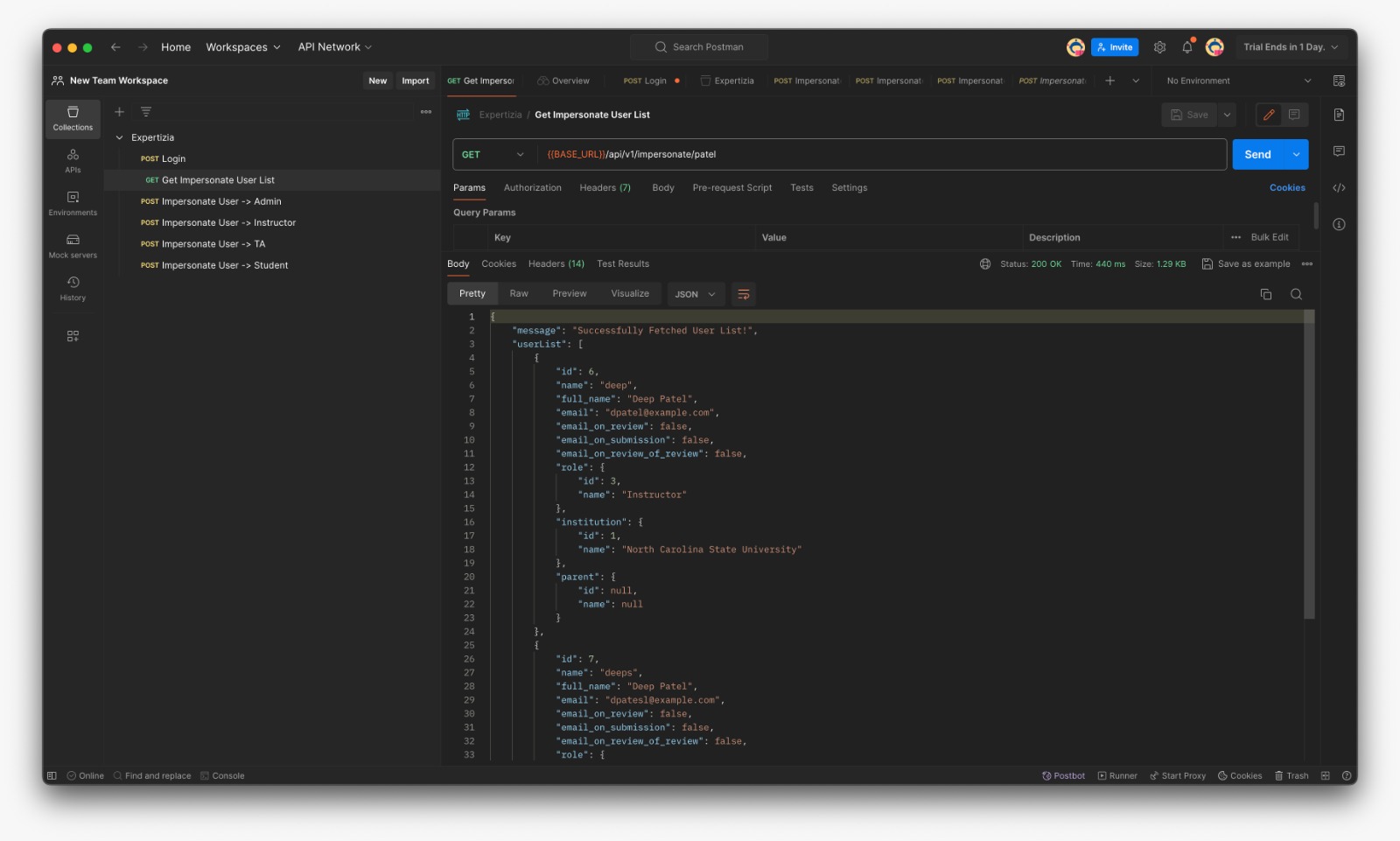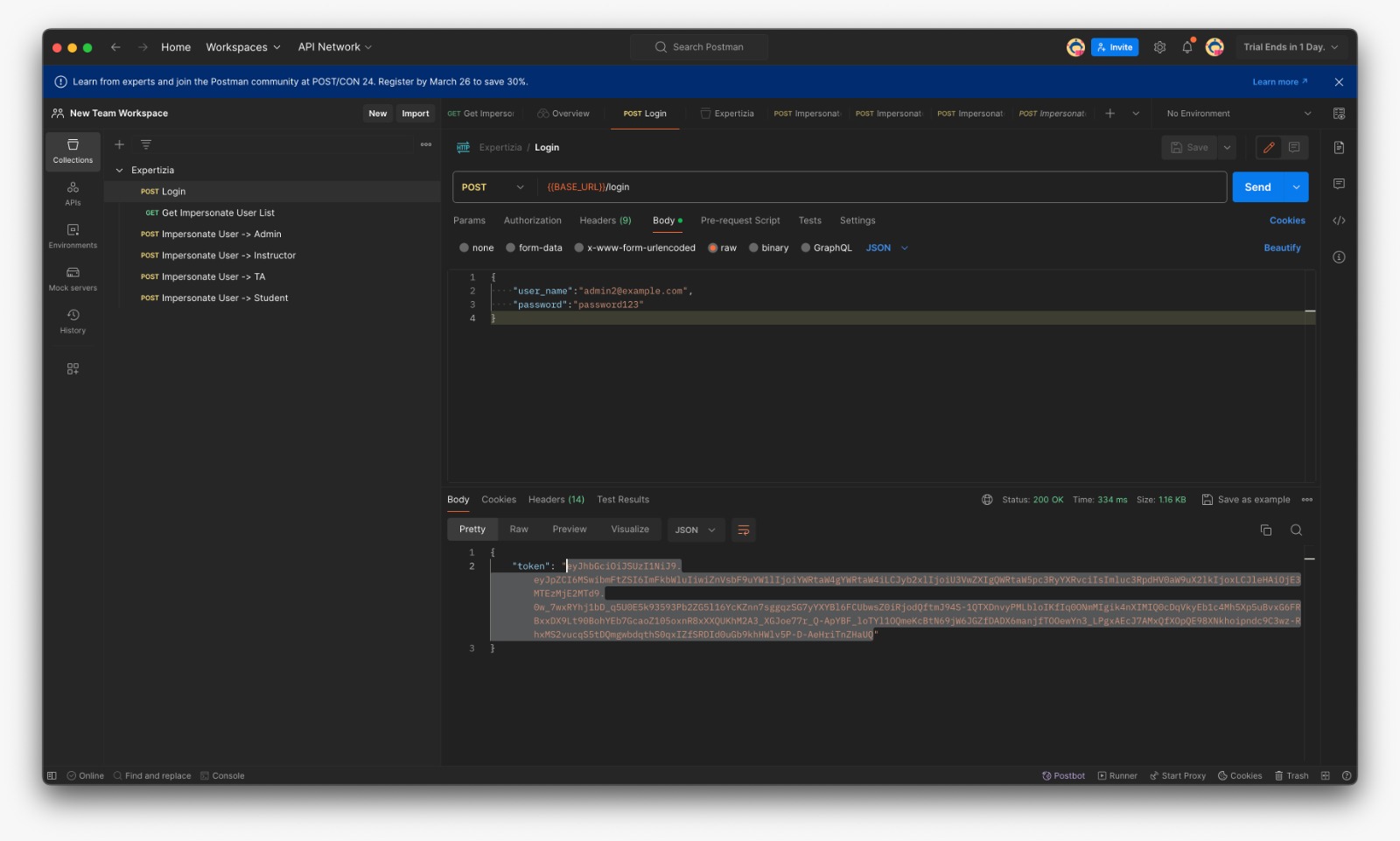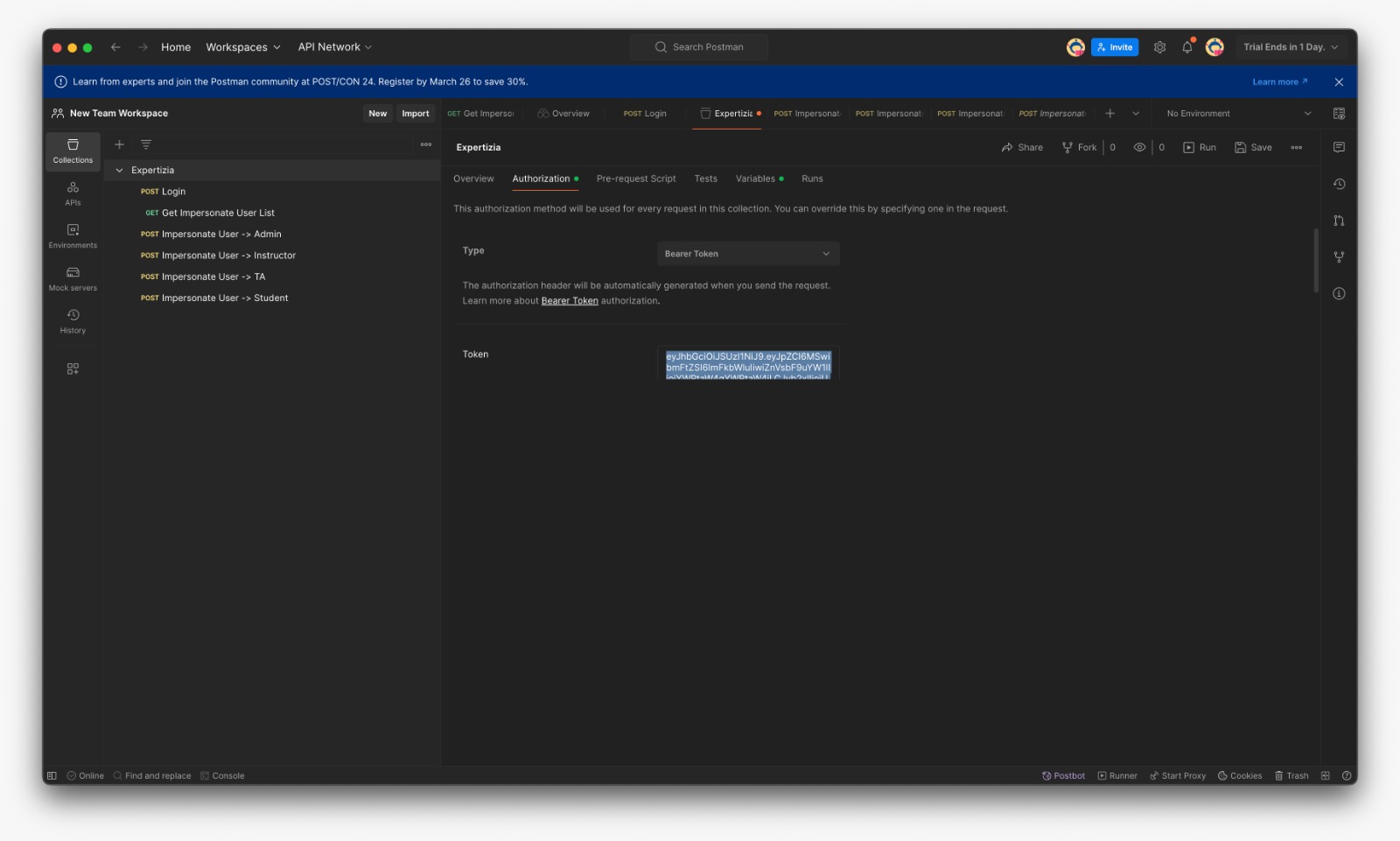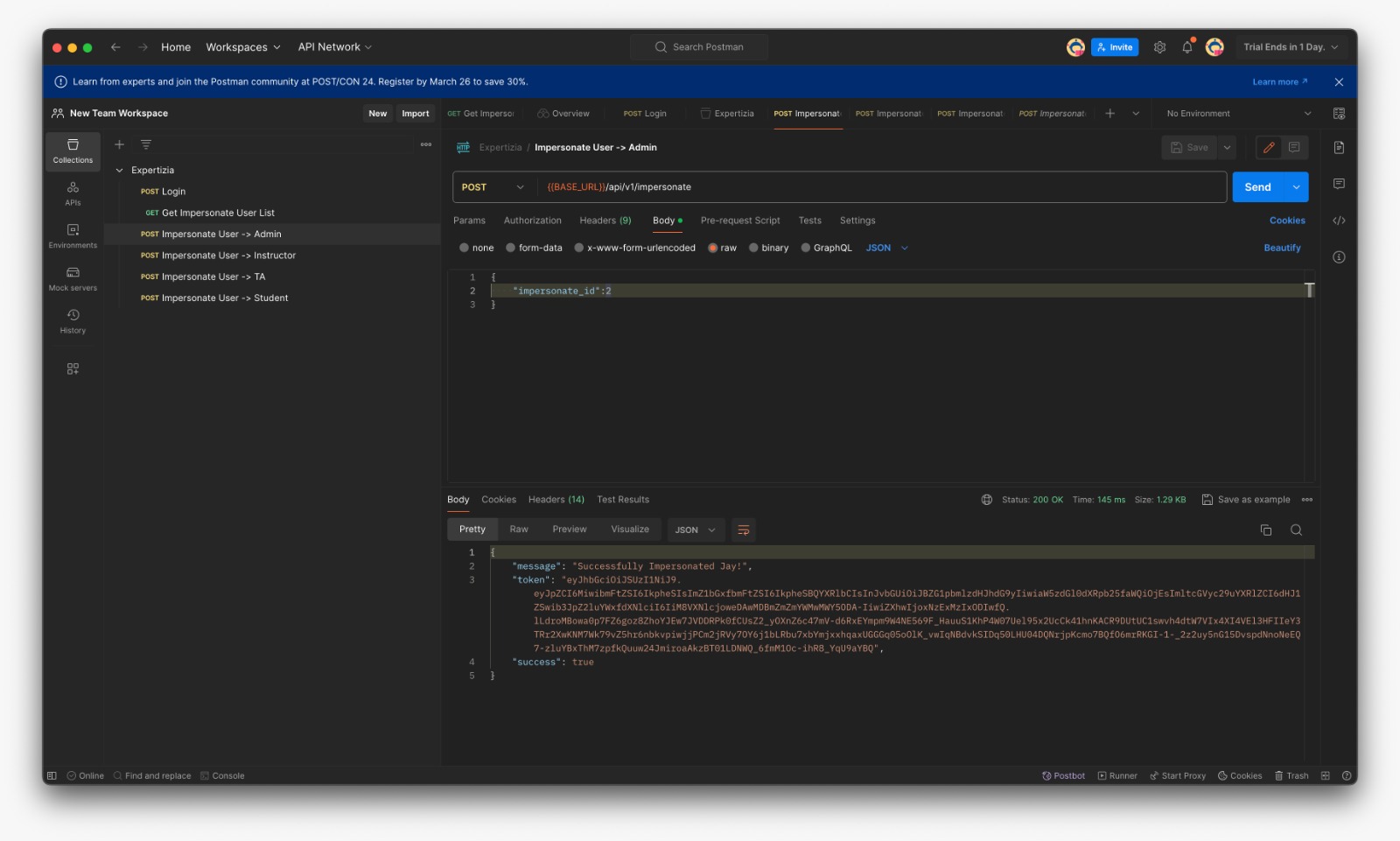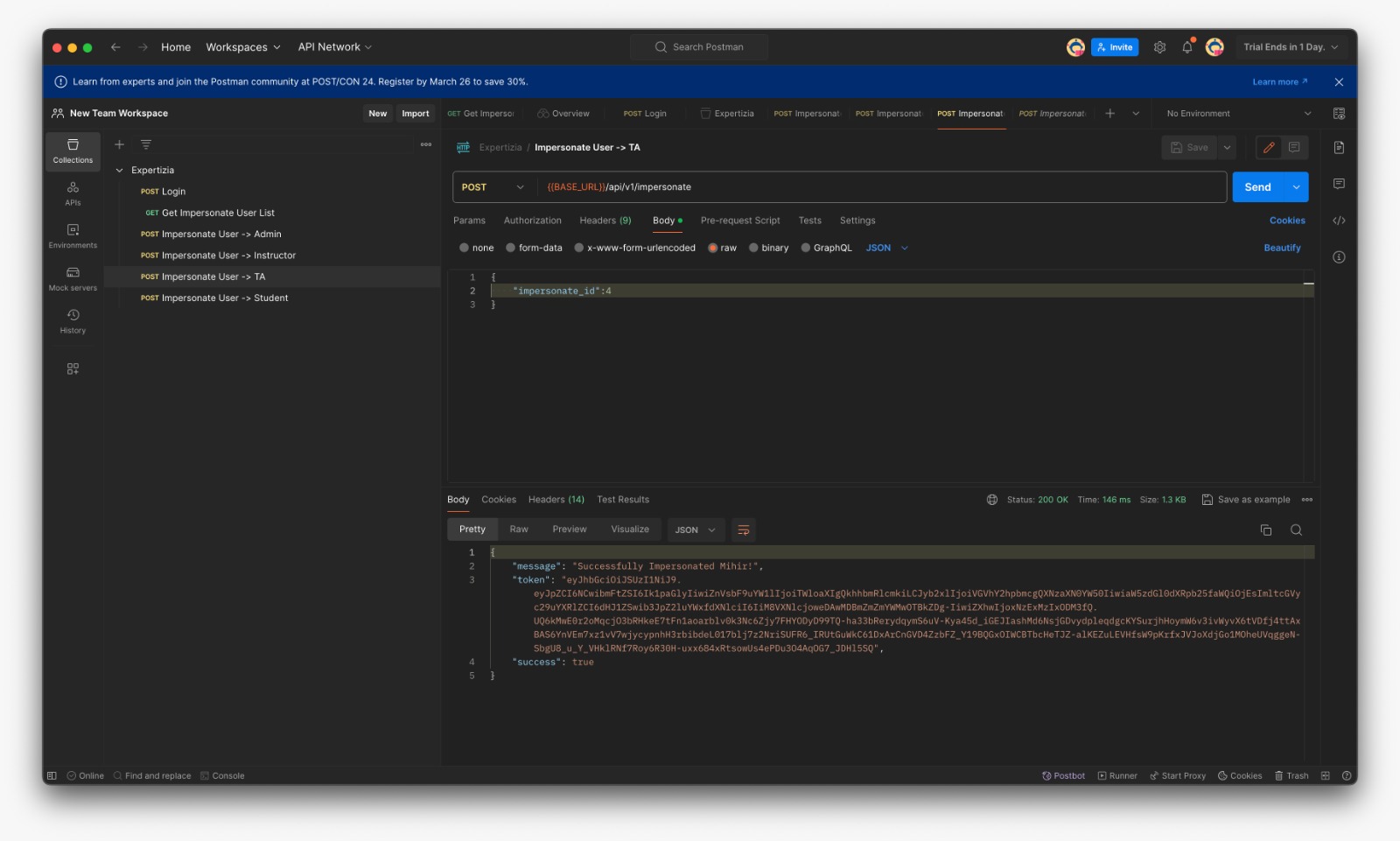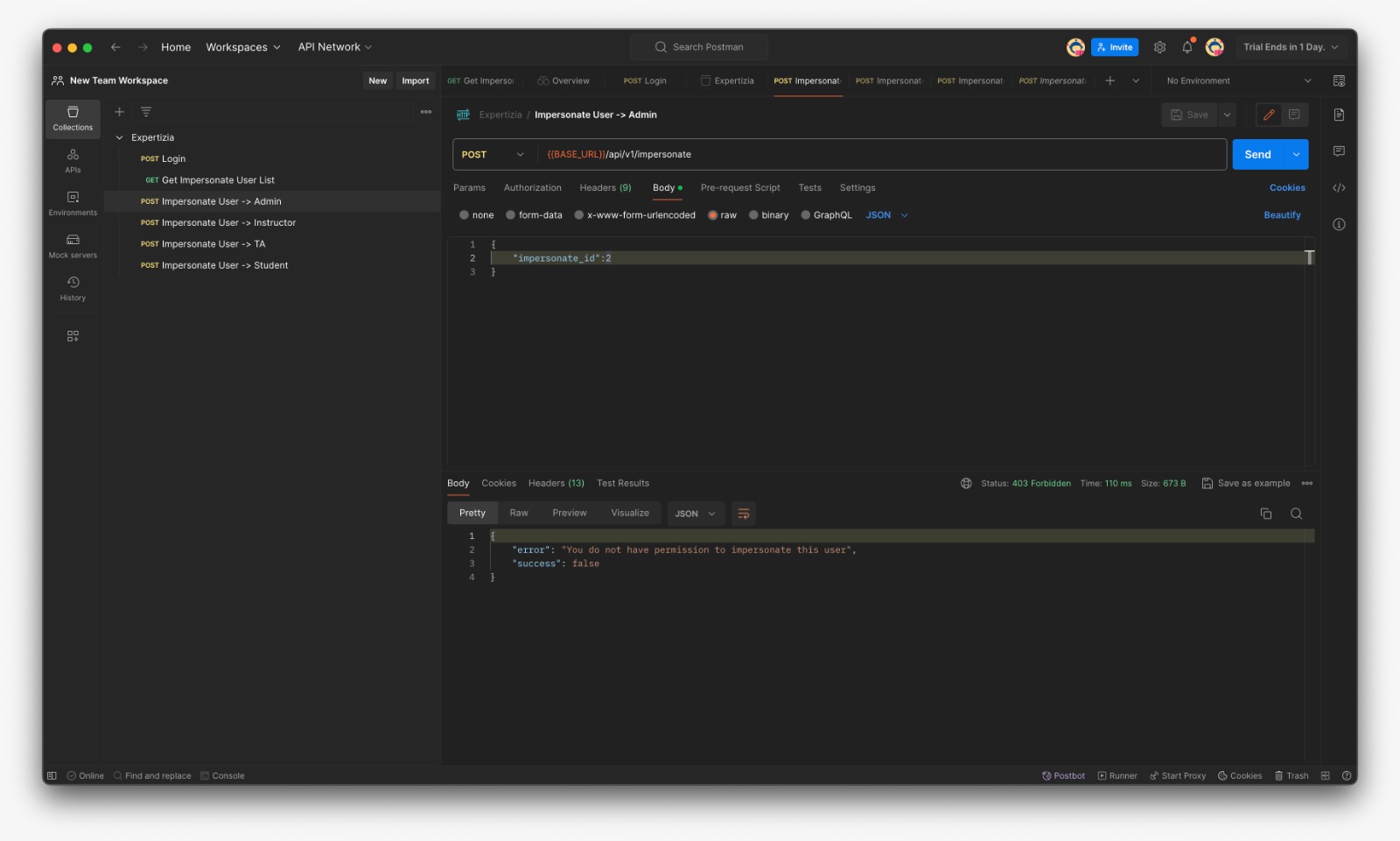CSC/ECE 517 Spring 2024 - E2421. Reimplement impersonating users (within impersonate controller.rb): Difference between revisions
No edit summary |
No edit summary |
||
| Line 9: | Line 9: | ||
==Implementation== | ==Implementation== | ||
===UML Diagram=== | |||
The following UML diagram shows the association between models we will be working on | The following UML diagram shows the association between models we will be working on | ||
[[File:Uml reimplement impersonate.png]] | [[File:Uml reimplement impersonate.png]] | ||
===Hierarchy Diagram=== | |||
Visualization of the hierarchical structure | |||
[[File:User-hierarchy.jpg]] | |||
===Request=== | ===Request=== | ||
| Line 52: | Line 60: | ||
"success": true | "success": true | ||
===Impersonate Controller=== | |||
impersonate_controller.rb file | |||
<pre> | |||
class Api::V1::ImpersonateController < ApplicationController | |||
# Fetches users to impersonate whose name match the passed parameter | |||
def get_users_list | |||
users = current_user.get_available_users(params[:user_name]) | |||
render json: { message: "Successfully Fetched User List!", userList:users, success:true }, status: :ok | |||
end | |||
def check_if_user_impersonateable? | |||
impersonate_user = User.find_by(id: params[:impersonate_id]) | |||
if impersonate_user | |||
return current_user.can_impersonate? impersonate_user | |||
end | |||
false | |||
end | |||
# Impersonates a new user and returns new jwt token | |||
def impersonate | |||
unless params[:impersonate_id].present? | |||
render json: { error: "impersonate_id is required", success:false }, status: :unprocessable_entity | |||
return | |||
end | |||
if check_if_user_impersonateable? | |||
impersonate_user = User.find_by(id: params[:impersonate_id]) | |||
payload = { id: impersonate_user.id, name: impersonate_user.name, full_name: impersonate_user.full_name, role: impersonate_user.role.name, | |||
institution_id: impersonate_user.institution.id, impersonated:true, original_user: current_user } | |||
impersonate_user_token = JsonWebToken.encode(payload, 24.hours.from_now) | |||
render json: { message: "Successfully Impersonated #{impersonate_user.name}!", token:impersonate_user_token, success:true }, status: :ok | |||
else | |||
render json: { error: "You do not have permission to impersonate this user", success:false }, status: :forbidden | |||
end | |||
end | |||
end | |||
</pre> | |||
Revision as of 01:15, 24 March 2024
Expertiza
Expertiza is a Ruby on Rails based open source project. Instructors have the ability to add new projects, assignments, etc., as well as edit existing ones. Later on, they can view student submissions and grade them. Students can also use Expertiza to organize into teams to work on different projects and assignments and submit their work. They can also review other students' submissions.
Project Overview
The objective is to reimplement the backend code for the impersonation feature in the new implementation of Expertiza. The current implementation relies on sessions, which won't be compatible with the new implementation using JWT tokens for authentication and returning JSON responses. The challenge lies in transitioning the logic from session-based management to JWT-based authentication while maintaining the functionality of impersonating users. The reimplementation involves planning how the backend will communicate with the frontend, potentially requiring changes in existing or new files beyond the impersonate_controller.rb.
Implementation
UML Diagram
The following UML diagram shows the association between models we will be working on
Hierarchy Diagram
Visualization of the hierarchical structure
Request
- GET: {BASE_URL}/api/v1/impersonate/:username
- Response:
"message": "Successfully Fetched User List!",
"userList": [
{
"id": 4,
"name": "Mihir",
"full_name": "Mihir BHanderi",
"email": "mbhande@example.com",
"email_on_review": false,
"email_on_submission": false,
"email_on_review_of_review": false,
"role": {
"id": 4,
"name": "Teaching Assistant"
},
"institution": {
"id": 1,
"name": "North Carolina State University"
},
"parent": {
"id": null,
"name": null
}
}
],
"success": true
- POST: {BASE_URL}/api/v1/impersonate
- Payload: impersonate_id - Response:
"message": "Successfully Impersonated Ketul!",
"token": "eyJhbGciOiJSUzI1NiJ9.eyJpZCI6MywibmFtZSI6IktldHVsIiwiZnVsbF9uYW1lIjoiS2V0dWwgQ2hheXlhIiwicm9sZSI6Ikluc3RydWN0b3IiLCJpbnN0aXR1dGlvbl9pZCI6MSwiaW1wZXJzb25hdGVkIjp0cnVlLCJvcmlnaW5hbF91c2VyIjoiIzxVc2VyOjB4MDAwMDdmMzVmYTc5YjVmOD4iLCJleHAiOjE3MTEzMjc0MTV9.U9wDOT618UCkf25MnCiK8W3ybeZv5BSQDNTEPOMUDABAvDd0HWSj3kIGccITHaoVsIykZFsyUDY3rL_M32zmfEXvxZuEleWSqUZGxbjQRIFP1bR_Q5sPESoBdlxVJ4QG8sUGQtuhOzMyH3z4R4ruhz1JpsQlalVZQHCbdtJOI9B4WKhNJ98Dls1fefnzYwLMnTr6e3ttbGGGK5Bm8zSpPvIWmCVNoueKHNptFcNejbU4Mt9RHWHLsTwdAtuywNLCu7li7RRNXo00D5JOUMxL7eB5AiQRpxah8BF7b0lM_Xh7bB56WvD5JTjoNZu3c3AK_EJksGXiFxwlPzNRc8Q",
"success": true
Impersonate Controller
impersonate_controller.rb file
class Api::V1::ImpersonateController < ApplicationController
# Fetches users to impersonate whose name match the passed parameter
def get_users_list
users = current_user.get_available_users(params[:user_name])
render json: { message: "Successfully Fetched User List!", userList:users, success:true }, status: :ok
end
def check_if_user_impersonateable?
impersonate_user = User.find_by(id: params[:impersonate_id])
if impersonate_user
return current_user.can_impersonate? impersonate_user
end
false
end
# Impersonates a new user and returns new jwt token
def impersonate
unless params[:impersonate_id].present?
render json: { error: "impersonate_id is required", success:false }, status: :unprocessable_entity
return
end
if check_if_user_impersonateable?
impersonate_user = User.find_by(id: params[:impersonate_id])
payload = { id: impersonate_user.id, name: impersonate_user.name, full_name: impersonate_user.full_name, role: impersonate_user.role.name,
institution_id: impersonate_user.institution.id, impersonated:true, original_user: current_user }
impersonate_user_token = JsonWebToken.encode(payload, 24.hours.from_now)
render json: { message: "Successfully Impersonated #{impersonate_user.name}!", token:impersonate_user_token, success:true }, status: :ok
else
render json: { error: "You do not have permission to impersonate this user", success:false }, status: :forbidden
end
end
end
Files added / modified
- reimplementation-back-end/app/models/user.rb
- reimplementation-back-end/app/controllers/api/v1/impersonate_controller.rb
- reimplementation-back-end/config/routes.rb
List of Users in Database
| ID | Password | Role | |
|---|---|---|---|
| 1 | admin2@example.com | password123 | Super-Administrator |
| 2 | jay@example.com | password123 | Administration |
| 3 | k2l@example.com | password123 | Instructor |
| 4 | mbhande@example.com | password123 | TA |
| 7 | dpatesl@example.com | password123 | Student |
Testing on Postman
Postman was used to manually test the additional method in impersonate_controller.rb, as well as the actions and routes of the corresponding controllers. Before testing any of these methods with Postman, submit a request to /login using the user_name and password fields, which will send an authentication token. This token must be added to Postman's 'Authorization' tab as a 'Bearer token' before any further requests can be made. Postman collection link
- Fetch User List which can be impersonated (For eg: If Instructor fetches list he can see matched TAs and Students only)
- Login with provided credentials and copy the token
- In the Expertiza/Authorization paste the token and save
- Put the id for the user to be impersonated
- Success message if the user is impersonable
- Failure message if the user is not impersonable (Here instructor is trying to impersonate admin)
Team
Mentor
- Chetana Chunduru <cchetan2@ncsu.edu>
Students
- Devansh Shah <dshah8@ncsu.edu>
- Jay Patel <jhpatel9@ncsu.edu>
- Mihir Bhanderi <mbhande2@ncsu.edu>
